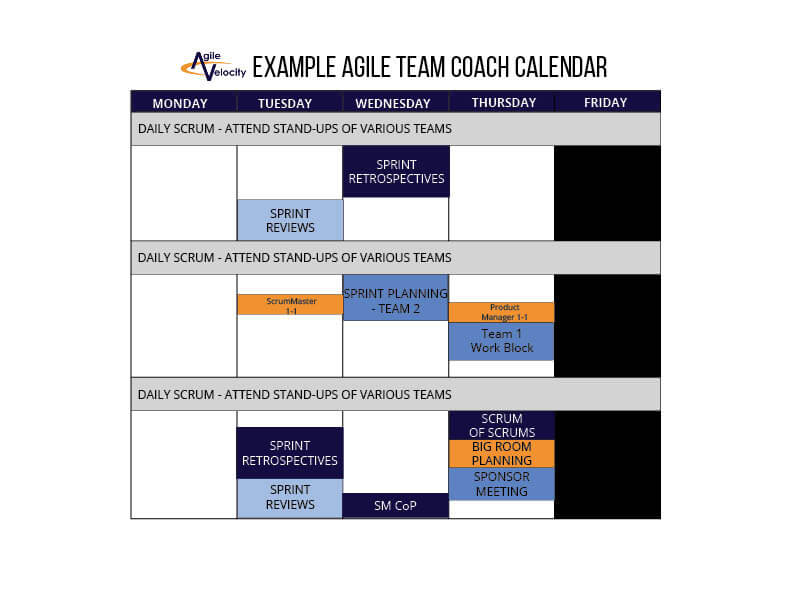Agile coaches are subject matter experts in Agile principles and practices and they apply their knowledge towards guiding struggling individuals, teams, and organizations. They are called when teams and organizations begin their Agile transformation, or if they when teams start and see realize that the road to high-performance may be rockier than expected. In both settings, the mission for the Agile coach is clear: help make the people, teams, and organizations they're working with better by unlocking their potential.
Hmmmm....a little nebulous?
What "better" means is different for every organization. Organizations embark upon an Agile adoption because of concrete goals they hope to achieve: faster time to market, improved quality, or happier customers. At the beginning of each engagement, the coach will work with stakeholder to define success and how it will be measured.
Role of an Agile Team Coach
We've discussed the Satir model of change before. It is normal for a decline in productivity after a change is introduced. This is called the chaos and resistance phase and it is this period when an Agile transformation is most at risk because teams and leadership are seeing negative results, i.e. the teams were worse than before.
An Agile Team Coach helps teams climb out of chaos and resistance faster by helping teams operate using Agile principles instead of simply using Agile processes. Through education, mentorship, leadership development, and the facilitation of the removal of impediments, they help teams internalize principles rather than blindly following a new process.
The type of coach also dictates their roles and responsibilities. Here, we have Team, System, and Organizational Coaches.
Team Coach
- Work to empower teams with the goal of making them autonomous and self-organizing
System Coach
- Work across teams and programs to optimize the full value stream
Organizational Coach
- Work with leadership and teams to enable a culture of agility
The main focus of this blog post is discussing the responsibilities of a Team Coach.
Agile Team Coaches Tackle...
In the beginning, Agile Team Coaches work with ScrumMasters and Product Owners and teach them the Agile framework using modeling and classroom training. As the engagement progresses, they switch places with the SM and PO, letting them execute while they observe and step in when needed. They focus on tactical wins that are easy to take care of, for example, helping the product owner with the first product backlog.
While the ScrumMaster has the authority to remove impediments, some will need to involve the leadership team. Examples include:
-
Creating cross-functional teams
-
Restructuring reviews
-
Resource and talent acquirement
-
Local optimization vs. Global optimization (i.e. budgeting)
-
Individual culture over team culture
In addition, Agile Coaches help ScrumMasters escalate problems to leadership and stakeholders and it is solving these big organizational challenges that require most of their time.
Sample Agile Team Coach Activities
Every organization has a unique set of strengths and challenges. When we have an Agile Team Coaching engagement, one of our first deliverables is a value stream map, a high-level view of the journey the product or request takes from inception to delivery. The value stream map places a spotlight on where value delivery slows or breaks down. From there, our coaches will determine a course of action to maximize their time and effort.
Coaches spend a significant amount of time on education, in an official and unofficial capacity, from leading a CSM workshop to helping a group of product owners hone their user story skills. There are also Communities of Practice (CoP) to form.
Coaches also re-assess constantly and are in a good position to do so. External team coaches are accountable but they are not invested. They are a third party that can provide an impartial perspective wholly focused on value delivery and completely void of company politics.
Sample Agile Team Coach Week Calendar
Did we mention meetings? In any given Sprint, a coach has the opportunity to attend:
-
Sponsor meeting
-
Scrum ceremony
-
1-1's (mentorship, problem-solving)
-
Scrum of Scrum (SoS) meetings
-
CoP meetings
-
AdHoc meetings - problem specific
-
Big Room Planning -
-
Training session presentation: new material or thought leadership
Below is a re-creation of the calendar of one of our coaches.

Agile has proven to deliver results but completing a transformation can be difficult. The latest State of Agile survey puts the success rate roughly at 50%. While teams can self-educate through books, blogs, and video, some concepts and principles are easier to grasp when there's an expert who has seen them play out on the field.
This is the first post in our Agile Coaching series. Our next post will discuss the various roles a coach plays during an engagement.
For more on our approach to building lasting business agility, you can check out our Transformation Services page.



